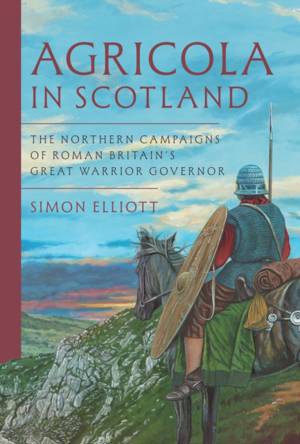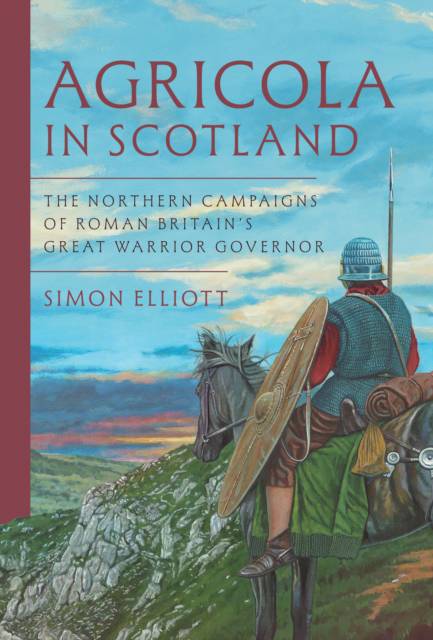
Bedankt voor het vertrouwen het afgelopen jaar! Om jou te bedanken bieden we GRATIS verzending (in België) aan op alles gedurende de hele maand januari.
- Afhalen na 1 uur in een winkel met voorraad
- In januari gratis thuislevering in België
- Ruim aanbod met 7 miljoen producten
Bedankt voor het vertrouwen het afgelopen jaar! Om jou te bedanken bieden we GRATIS verzending (in België) aan op alles gedurende de hele maand januari.
- Afhalen na 1 uur in een winkel met voorraad
- In januari gratis thuislevering in België
- Ruim aanbod met 7 miljoen producten
Zoeken
Agricola in Scotland
The Northern Campaigns of Roman Britain's Great Warrior Governor
Simon Elliott
Hardcover | Engels
€ 34,95
+ 69 punten
Omschrijving
A gripping account of Agricola's bloody campaigns in Scotland, revealing how Rome pushed beyond its frontier.
Agricola was the great Flavian warrior governor of Britain tasked by the emperor Vespasian with conquering the far north of its main island for the first time. Initially campaigning in Wales and then the north of modern England to secure his rear, he launched his first assault into modern Scotland at the end of the 70s AD. Four more bloody campaigns beyond the Solway Firth-Tyne frontier followed, each time the Romans heading further and further into the heart of darkness, as they would have seen it. Famously, at one stage during the campaigns he also contemplated invading Ireland, only to be told no by the new emperor, Domitian. Ultimately, the primary sources say he defeated the combined armies of the natives in far north at the Battle of Mons Graupius in AD 83. After this, the successful conquest of the whole island was declared, Agricola commanded the Classis Britannia (the Roman navy in Britain) to circumnavigate the whole province for the first time, and Domitian ordered a monumental arch to be built at Richborough on the east coast of Kent to celebrate the Roman triumph. This became the imperial gateway into Roman Britain.
In this new, generation-defining book on Agricola's campaigns in Scotland new archaeological evidence will be used to show how Agricola was able to campaign so far north of the imperial frontier and in such numbers (with over 30,000 men, plus the fleet), and the exact routes he followed. Thus, for the first time, the true story of Agricola in Scotland can be told.
Agricola was the great Flavian warrior governor of Britain tasked by the emperor Vespasian with conquering the far north of its main island for the first time. Initially campaigning in Wales and then the north of modern England to secure his rear, he launched his first assault into modern Scotland at the end of the 70s AD. Four more bloody campaigns beyond the Solway Firth-Tyne frontier followed, each time the Romans heading further and further into the heart of darkness, as they would have seen it. Famously, at one stage during the campaigns he also contemplated invading Ireland, only to be told no by the new emperor, Domitian. Ultimately, the primary sources say he defeated the combined armies of the natives in far north at the Battle of Mons Graupius in AD 83. After this, the successful conquest of the whole island was declared, Agricola commanded the Classis Britannia (the Roman navy in Britain) to circumnavigate the whole province for the first time, and Domitian ordered a monumental arch to be built at Richborough on the east coast of Kent to celebrate the Roman triumph. This became the imperial gateway into Roman Britain.
In this new, generation-defining book on Agricola's campaigns in Scotland new archaeological evidence will be used to show how Agricola was able to campaign so far north of the imperial frontier and in such numbers (with over 30,000 men, plus the fleet), and the exact routes he followed. Thus, for the first time, the true story of Agricola in Scotland can be told.
Specificaties
Betrokkenen
- Auteur(s):
- Uitgeverij:
Inhoud
- Aantal bladzijden:
- 216
- Taal:
- Engels
Eigenschappen
- Productcode (EAN):
- 9781399068284
- Verschijningsdatum:
- 30/09/2025
- Uitvoering:
- Hardcover
- Formaat:
- Genaaid
- Afmetingen:
- 154 mm x 236 mm
- Gewicht:
- 430 g

Alleen bij Standaard Boekhandel
+ 69 punten op je klantenkaart van Standaard Boekhandel
Beoordelingen
We publiceren alleen reviews die voldoen aan de voorwaarden voor reviews. Bekijk onze voorwaarden voor reviews.









